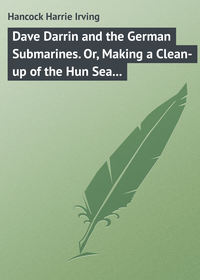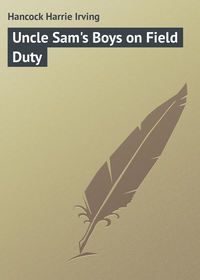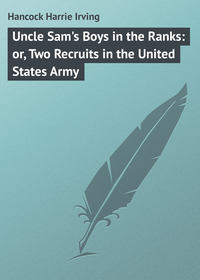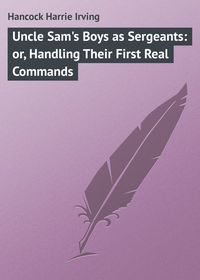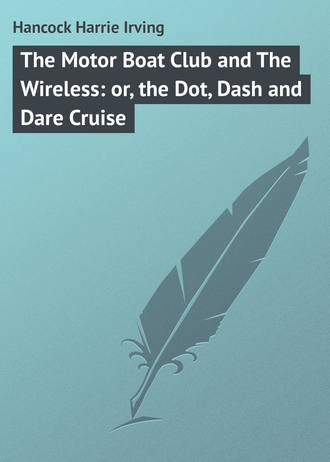 полная версия
полная версияThe Motor Boat Club and The Wireless: or, the Dot, Dash and Dare Cruise
“Not when you stop to consider the value of the freight steamships, and the value of their cargoes,” rejoined Tom Halstead. “If a ship at sea gets into any trouble, where in older times she would have been lost, now all she has to do is to signal to other vessels within two or three hundred miles, and relief is sent on its way to the ship that needs it. In the case of a freight steamer the wireless aboard means greater safety for the crew and often saves the owners the cost of ship and cargo. The Standard Oil people were among the first to think of the wireless for cargo-carrying boats. They installed the wireless on their tank steamers, and it wasn’t long before the owners of other freight vessels realized the value of such an installation. Now, every freight boat that amounts to much has the wireless aboard.”
“You speak of the wireless being used at a distance of two or three hundred miles,” pursued the charter-man. “Dawson can’t send the electric wave that far, can he?”
“No, sir; because our signal mast is shorter than that on a big steamship. The length of our aerials is less. Still, we can handle a message for a pretty good distance.”
“What distance, Halstead?”
“Why, our ideal distance is about sixty miles; we can make it seventy easily, and, under the best conditions, we can drive a message, so that it can be understood, for about ninety miles. But that doesn’t really hold us down to even ninety miles. If there’s a wireless ship within our radius we can ask her to relay for us. With a few ships spread out at proper intervals we could easily wire direct from the ‘Restless’ to the coast of England.”
“Joe,” called Tom to his chum as the latter came on deck between wireless performances, “do you notice that the fog is lightening off to weatherward?”
“Yes; the fog is heaviest off to westward, and we’ve been working out of that.”
“By the time we reach the ‘Glide’ I believe we’re going to have some open weather around us.”
“It will be fine if we do,” nodded young Dawson. “It’s nasty work going up alongside of a big ship when you can’t see fifty feet away.”
As they watched and waited, while the “Restless” stole slowly along, the fog about them became steadily lighter, though off to the westward it remained a thick, dense bank.
“Say, it’d be great to have four or five miles of clear sea around us, so that we could see whether the seventy-foot boat has kept to anything like our course,” declared Hank.
At last the “Restless” came to within twenty minutes’ hailing distance of the “Glide,” as the young motor boat skipper figured it. Then, a few minutes later, a deep-toned fog-horn came to them faintly. As the minutes passed, now, this blast became heavier and nearer.
“I’ve only a few minutes left with you, Joe, old chum,” declared Captain Tom, with a half-sigh. “You’ll take great, good care of the dear old craft, I know, while I’m gone.”
“As soon as Mr. Seaton is done with the boat I’ll tie her up until you get back – that’s what I’ll do,” grunted Dawson. “No sailing without a skipper for me.”
“You needn’t look so bad about it, Cap,” grinned Hepton. “I wish it was me, cut out for a long trip to Rio and back. Maybe I wouldn’t jump at such a chance. Some folks are born lucky!”
Too-woo-oo!
The oncoming steamship’s deep fog-horn sounded loud and sullen, now. Tom Halstead, still at the wheel, was peering constantly forward for the first glimpse of the freighter, for the fog had lightened much by this time.
“There she is!” hailed keen-eyed Joe, on the lookout for this sight. “You can just make out her bow poking up through the fog. She must be a thousand feet off yet.”
With two boats approaching each other, this distance was, of course, quickly covered. Finding that he could see the other craft at such a distance, Skipper Tom threw on a little more speed, making a wide turn and so coming up alongside on a parallel course.
“Take the wheel, Hank,” directed the young skipper, seizing the megaphone and stepping to the port rail.
“‘Glide,’ ahoy!” bawled Halstead through the megaphone.
“‘Restless,’ ahoy!” came back from the freighter’s bridge.
“Lie to and let us come alongside, won’t you? We want to put a passenger aboard.”
“Passenger? Where for?”
“Rio, of course. That’s where you’re bound, isn’t it?”
“You’ll have to be mighty quick about it,” came the emphatic answer. “We can’t afford stops on our way.”
“We may want to delay you a few minutes,” began Tom.
“Few minutes, nothing!” came the gruff retort. “We can’t be held up in that fashion.”
“We can pay for all the trouble we put you to,” retorted Halstead. Powell Seaton produced and waved a bulky wad of banknotes.
“Oh, if you want to pay extra, above the fare, it’ll be a little different,” came, in mollified tones, from the bridge. The captain of the “Glide” was now much more accommodating. The fare received from a passenger put aboard in mid-sea would go to the owners of the freighter. But any extra money, paid for “trouble,” would be so much in the pocket of the “Glide’s” sailing-master.
Several new faces appeared at the rail of the freighter, as that big craft slowed down and one of her mates superintended the work of lowering the side gangway.
“Hullo, lobster-smack!” roared one derisive voice above the freighter’s rail.
“Say,” called another voice, jeeringly, “it may be all right to go lobster-fishing, but it’s no sort of good business to leave one of your catch of lobsters in command of even a smack like that!”
Tom Halstead reddened angrily. One of his fists clenched unconsciously as he shot a wrathful look upward at the rail.
“Say, you mentally-dented pilot of a fourth-rate peanut roaster of a boat, do you go by craft you know without ever giving a hail?” demanded a mocking voice, that of the first derisive speaker.
Standing at the rail of the “Restless,” Tom Halstead almost dropped the megaphone overboard from the sheer stagger of joy that caught him.
“Hey, you Ab! You worthless Ab Perkins!” roared the young motor boat skipper, in huge delight. “And you, Dick Davis!”
The two who stood at the “Glide’s” rail overhead, and who had called down so mockingly, stood in uniform caps and coats identical with those worn by Halstead and his mates aboard the motor boat. They wore them with right, too, for Perkins and Davis were two of the most famous of the many youngsters who now composed the Motor Boat Club of the Kennebec.
“Hey! What’s this?” roared the usually quiet Joe Dawson, his face wreathed in smiles. He almost danced a jig.
Hank Butts had never before seen either Davis or Perkins, but he knew about them, all right. He knew that uniform, too, the same that he wore.
“Now, then – altogether!” yelled Hank. “Give it with a roar, boys!”
Powell Seaton stared in bewildered amazement. So did officers, crew and others at the “Glide’s” rail and on her bridge.
For five lusty young Americans, all wearing the same uniform, all bronzed deeply with the tan that comes of the gale and the sun, all keen-eyed, quick and sure as tars ever are, roared in mighty chorus:
“M-B-C-K! M-B-C-K! Motor Boat Club! WOW!”
CHAPTER XVIII
THE FIRST KINK OF THE PROBLEM SOLVED
Again the roaring chorus rang out.
“What’s this? College boys’ joke on me, or a floating mad-house?” huskily roared down the freighter’s captain from the bridge.
“It’s all right, captain,” sang back Tom Halstead. “We’ll make it plain to you as soon as we get a chance. We’re neither as bad nor as dangerous as we seem.”
The “Glide’s” headway had all but ceased by this time, and the side gangway was at last in place. The “Restless” was run in close, while Hank stood up on the top of the forward deck-house with a coil of line, waiting until it came time to leap across onto the platform of the freighter’s gangway and make the line fast.
As quickly as the line was secured Captain Tom Halstead followed Butts, and dashed on past him up the steps of the gangway. Ab and Dick came down to meet him, each grabbing one of the young skipper’s hands and wringing it.
Then they turned to give the same greeting to Joe Dawson, who gasped:
“Gracious, but it does seem good to meet fellows of the Club and from the old home town at that!”
Mr. Seaton, though following in more leisurely fashion, now passed them, going on up to the deck. There he met Captain Rawley.
“Don’t mind what my young men do, captain,” begged the charter-man, “and don’t mind if they delay you for a few minutes. I’ll make good the damage.”
“Help yourself to a little of my time, then, sir,” grimaced the freighter’s captain. “Anything that I can spare from the proper time of the run, you understand.”
“How on earth do you fellows happen to be on this ship, of all places in the world?” demanded Tom Halstead.
“Easy enough to explain,” laughed Dick Davis. “Port authorities at Rio were good enough to order six motor boats for harbor purposes. My dad got the chance of building the boats at his yard at Bath. The Rio motor boats are on board, down in the hold, and Ab and I are sent along to deliver the motor boats, put them in running order at Rio, and, if necessary, teach the natives how to run such craft.”
“Did you fellows know we were signaling you by wireless?” Joe was asking Ab Perkins. “Did you know that you were going to see us?”
“Didn’t know a blessed thing about it,” admitted Ab Perkins, almost sheepishly. “Dick and I were asleep in our stateroom. We were getting ready to come out on deck when we felt the old tub slackening speed. Then we came out to see what was happening. We looked over the rail, and —wow!”
Ab again seized Joe Dawson’s hand, giving it another mighty shake. Then the irrepressible Ab reached out for Tom’s hand, but Dick Davis was drawing Halstead up on deck.
Readers of the first volume of this series will remember both Ab and Dick well. They, too, were boys born near the Kennebec River, and took part in the stirring adventures narrated in The Motor Boat Club of The Kennebec, just before Tom and Joe left for the next scenes of their activities, as related in The Motor Boat Club at Nantucket and The Motor Boat Club off Long Island. Ab Perkins and Dick Davis were two of the most valued of the early members of the Club.
All in a twinkling, Tom Halstead was seized by an idea. He looked about for Powell Seaton, saw that gentleman talking with Captain Rawley, and caught the charter-man’s eye.
“See here, Mr. Seaton,” whispered Halstead, as soon as he had gotten his employer aside, “there’s no great need for me to go to Rio.”
“No?”
“Of course not. Give the papers to Dick Davis, with exact instructions as to who is to receive them at Rio Janeiro, and those papers will get into exactly the hands for which you intend them.”
“You feel certain of that, Halstead?” demanded Powell Seaton, his voice tremulous with anxiety.
“Absolutely sure, sir. Dick Davis can be trusted as long the world holds together. There isn’t the faintest yellow streak in him, either. Square, straight, keen, brave – that’s Dick Davis. And Ab Perkins would go through the jaws of anything with Davis! Why, Mr. Seaton, they’re Motor Boat Club boys! You can trust them to the same degree as you’re willing to trust me. Moreover, they’re going down to Rio on a mission to the Government. They’ve got a better chance to get ashore, unmolested and unwatched, than any other stranger would have.”
“Get your friends together, then, somewhere where we can have a private corner,” begged Powell Seaton. “We’ll talk this matter over – we’ve got to talk like lightning, at that.”
While Mr. Seaton sought Captain Rawley, Tom shot back along the deck to where Joe, Hank and the two Rio-bound members of the Motor Boat Club stood talking.
“Hank,” said Tom, in a low voice, “Hepton is all alone down on the ‘Restless,’ except for our prisoner aft. Hepton may be all right, and I think he is – but one of our own crowd ought to be on board our boat.”
“I’ll be the one, then,” half-sighed Hank Butts, turning to descend the side gangway.
Captain Rawley promptly agreed to turn his own cabin over to the friends who wanted a private chat.
“But only for five minutes, mind you,” he insisted. “Then I must be on my way.”
Behind the closed door of the captain’s room Powell Seaton and Tom Halstead swiftly explained what was wanted.
“Will we do it?” said Dick Davis, repeating the question that had been asked him. “Why, of course we will. There’s only one answer possible. Tom Halstead is fleet captain of the Motor Boat Club, and a request from Captain Tom is the same thing as an order.”
“You will go straight to the American consulate at Rio Janeiro, then,” directed Mr. Seaton. “From the consulate you will send a messenger to bring to you Shipley D. Jarvis, whose address is the American Club. The American consul will be able to assure you that it is Shipley D. Jarvis who comes to you. You will turn over these papers to Mr. Jarvis in the presence of the American consul. A letter from me is in the envelope with the papers. That is all, except–”
After a brief pause Mr. Seaton went on to caution Dick Davis and Ab Perkins as to the dangers against which they must guard on the way. This Tom Halstead supplemented with an exact description of Anson Dalton and of Captain Dave Lemly, of the now seized “Black Betty.”
“Either, or both, of the rascals may board this ship a little further along,” cautioned Mr. Seaton. “Night and day you must be on your guard against them.”
Then Tom Halstead quickly outlined to Davis a system of apparently common-place wireless messages by means of which Davis might be able to keep Mr. Seaton informed of the state of affairs, for some days to come, on board the “Glide.”
Some further last instructions were added. Powell Seaton wound up by forcing a few banknotes into the hands of both these unexpected messengers.
“Wait until we’ve succeeded,” proposed Dick Davis.
“This is for expense money, for sending wireless messages, and other things,” replied Mr. Seaton. “Your real reward will come later on.”
“When we’ve succeeded,” nodded Davis.
So much time had been taken up by this talk that now all had to step out on deck.
“We’re ready to go aboard our boat, sir,” Skipper Tom reported.
“You and Dawson go, Halstead,” nodded Mr. Seaton. “I want not more than sixty seconds with Captain Rawley in his own room.”
When the charter-man of the “Restless” came out once more the thick pile of banknotes in his pocket had grown a good deal thinner, but Captain Rawley had been enlisted as a friend to the cause.
“Good-bye, old chums,” cried Dick Davis, gripping a hand of Tom and Joe with each of his own.
“Good-bye! Good luck now, and all the way through life!” murmured Tom, earnestly, and with a hidden meaning that Davis caught.
As speedily as Tom and Joe had assisted Powell Seaton aboard the motor boat, Hank cast off, while the crew of the “Glide” began to raise the side gangway.
There were more rousing farewells between the two groups of Motor Boat Club boys. Then the hoarse whistle of the “Glide” sounded, and the freighter began to go ahead at half-speed.
The “Restless” fell away and astern, yet she followed the freighter. That she should do so had been understood with Captain Rawley, and with Dick and Ab. Powell Seaton intended to keep the “Glide” within sight for at least thirty-six hours, if possible, in order to make sure that the seventy-foot drab boat did not attempt to put Anson Dalton or any other messenger on board.
“If we stick to the sea for a hundred years, Joe,” laughed Skipper Tom, as he followed the bigger craft at a distance of eight hundred feet, “nothing as lucky as this is likely to happen again. I was afraid I was booked for Rio, for sure, and it made me heartsick to think of leaving the ‘Restless’ so long and living aboard a big tub of an ordinary, steam-propelled ship!”
“I’ve taken the step, now, and can’t very well change it,” declared Mr. Seaton, who looked both pale and thoughtful. “Halstead, all I can hope and pray for is that your comrades on the ship ahead are as clever and watchful, as brave and honest as you think.”
“If wondering about Dick and Ab is all that ever worries me,” laughed Tom Halstead, easily, “I don’t believe I shall ever have any wrinkles. I know those boys, Mr. Seaton. We were born and raised in the same little Maine seacoast town, and I’d trust that pair with the errand if it were my own diamond field at stake.”
The fog had lifted sufficiently, by this time, so that clear vision was to be had for at least a quarter of a mile.
Skipper Tom whistled as he handled the wheel. Joe Dawson was so relieved in mind that, after a careful look at the motors, he threw himself upon one of the berths opposite and dozed. Hank put in his time looking after preparations for supper.
“What ails you, Halstead?” demanded Seaton, pausing abruptly beside the young skipper.
For the boy had turned, suddenly, to a sickly pallor.
“It has just struck me, sir,” confessed the young motor boat skipper, “that, if Dalton has the slightest suspicion of what we’ve done to outwit him, he’s just the man who will be desperate enough to put his whole set of papers in at the nearest cable office for direct sending to Rio Janeiro!”
CHAPTER XIX
HELPLESS IN THE NORTHEASTER!
“I’ve already thought of that,” nodded Powell Seaton.
“And it doesn’t worry you, sir – doesn’t make you anxious?” questioned Captain Tom Halstead.
“No. Of course, Dalton might cable the full contents of the papers. If the paper could fall only into Governor Terrero’s hands it would be well worth the cable tolls. But if such a cablegram were sent, openly, to Terrero, or one of his representatives, it would have to go, first of all, through the hands of the Government officials who have charge of the cable.”
“But couldn’t Terrero fix that?” asked Halstead.
“No; Rio is out of his state, and beyond the sphere of his strongest influence. Now, if I were to land in Rio Janeiro, I would be arrested on a warrant issued by Terrero’s judges, up in the state of Vahia, and I would have to go to Vahia for trial. Undoubtedly Terrero’s rascally officers would shoot me on the way, and report that I had tried to escape.”
“Then what harm could it do to Terrero’s chances for Dalton to send him the cablegram direct?”
“Why, either the cable officials in Rio are very great rascals, or else they are honest officials. If they are rascals, they might hold the cablegram long enough to act for themselves on the information it contained. On the other hand, if they are honest officials, then they would undoubtedly notify the Government of such a stupendous piece of news. The Government would then very likely take charge of my diamond field itself, which would be wholly legal, for the Government already owns many, if not the greater number, of the producing diamond fields of that country. So, if the Government, acting on information from its cable officials, took possession of the news and of the diamond field, what good would the cablegram do Governor Terrero? No; you may be very sure that Dalton won’t send the contents of the papers by cablegram. He undoubtedly has the strongest orders from Terrero against doing that.”
“I feel better, then,” Tom admitted. “For the moment it came over me, like a thunderbolt, that Dalton might nip all our work in the bud by sending a cablegram. Still, couldn’t he send it by code?”
“No; for only the ordinary codes can go through the Brazilian cable offices, and the Government officers have the keys to all the codes that are allowed. Rest easy, Halstead; Dalton won’t attempt to use the cable.”
“Then, if he doesn’t get aboard the ‘Glide,’ we’ll beat him out to Brazil – that’s the surest thing in the world!” cried Tom, with as much enthusiasm as though the great fortune at stake were his own.
They were still following in the wake of the “Glide.” Once in a while Dick Davis or Ab Perkins had the operator on the freighter flash back a wireless message of a friendly, personal nature. Joe answered all these.
For thirty-six hours this pleasant stern-chase lasted. By night the helmsman of the “Restless” kept the searchlight enough in use to make sure that the drab boat did not appear.
“Dalton and Lemly lost the ‘Glide,’ if they were looking for her, in the fog,” chuckled Halstead, in huge satisfaction. “Any Rio-bound boat they can catch now is hopelessly to the rear of the ‘Glide,’ I reckon.”
Joe, by wiring back, and asking other wireless vessels to relay, from time to time, had ascertained that there was no other steam vessel, bound for Rio, in close pursuit.
Mr. Seaton took his trick at the wheel occasionally. So did Hepton. Joe gave most of his time to the wireless installation, though he maintained charge of the motors, Hank doing most of the work there. All had sleep enough during the cruise south. Joe used some of his spare time in carrying out his former plan of connecting the wireless table with the helmsman by means of a speaking tube.
They were well down the coast of Florida when even anxious Powell Seaton declared that there was no need of cruising longer in the wake of the “Glide.” He felt certain that the freighter had entirely eluded the vigilance of those on board the drab boat.
By this time the supply of gasoline was nearly out. Tom had cautioned the charter-man that so long a run would use up about the last of their oil. There was, however, a small sail fitted to the signal mast. Now, when the crew of the “Restless” turned back, the sail was hoisted and power shut off.
“We’ve oil enough to run perhaps three-quarters of an hour, sir,” the young skipper explained. “We’ll have to use that up in making port when we get in sight.”
Sailing aboard the “Restless” proved lazy work at the outset. With this small sail there was not wind enough to carry the boat at much more than two miles per hour on her northwest course for the nearest Florida town where gasoline was likely to be had.
“We’ll have a jolly long sail of it,” laughed Skipper Tom, “unless the wind should freshen.”
“Well, we don’t care,” smiled Mr. Seaton. “At least, you won’t be overworked. And our minds are easier – mine especially.”
“All of us have easier minds,” Halstead retorted. “Don’t you understand, sir, that the rest of us have taken this whole business to heart? We couldn’t be more concerned than we are to see the affairs of our charter parties come through all right.”
“Oh, I believe that,” nodded Powell Seaton. “You boys have been the strongest sort of personal friends to me in my troubles. You couldn’t possibly have made my affairs, and my dangers, more thoroughly your own troubles.”
Two hours later a wireless message came back from the “Glide.” It was from Dick Davis, and couched in vague terms, but meant to inform those aboard the “Restless” that the drab seventy-footer was still out of sight. An hour after that a second message reached the motor boat. Soon after the “Restless” found herself unable to answer, though still able to receive.
“Hank, are you feeling particularly strong to-day?” inquired Mr. Seaton.
“I’m always strong, sir,” replied the young steward.
“Then why not rack your pantry stores in order to supply the biggest thing in a meal for all hands this evening? I feel more like eating than I have any day in a month.”
“You’d have to go to a sure-enough number-one hotel to find a better meal than I’ll put up for this evening,” retorted Hank, grinning gleefully, as he started for the galley.
In such lazy weather Tom Halstead felt that he could go below for a nap, especially as Joe was around. Hepton was left at the wheel. Tom speedily closed his eyes in one of the soundest naps he had enjoyed in many a day. He was awakened by Hank, who came into the stateroom and shook him by the shoulder.
“Weather’s all right, up to now,” Butts informed the young captain. “Still, we don’t like the looks of the sky, and the barometer is beginning to show signs of being eccentric. Won’t you come up on deck for a minute, anyway?”
Tom was out of his berth in a twinkling. There was enough of the sea-captain in him for that. The instant he reached the deck his gaze swept around anxiously, inquiringly, at the sky.
“The clouds up on the northeast horizon don’t look exactly friendly, do they?” he inquired of Joe.


